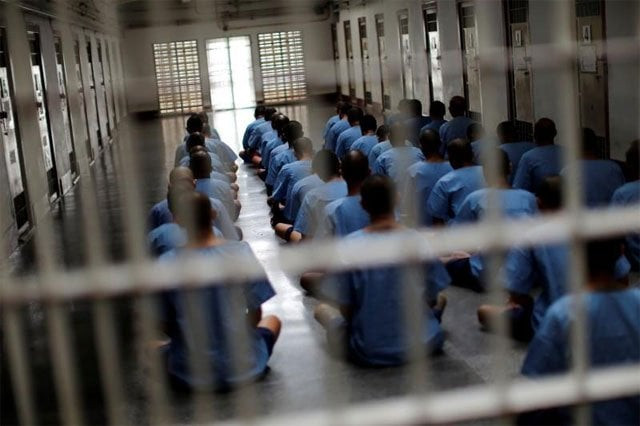Extradition treaties with China, Saudi Arabia approved
Accords will allow convicts to complete jail terms in country of their origin

Accords will allow convicts to complete jail terms in country of their origin. PHOTO: REUTERS
The decision was taken during the cabinet’s weekly huddle presided over by Prime Minister Shahid Khaqan Abbasi at the Prime Minister’s Office.
Official sources said following the cabinet’s go-ahead, the respective inputs of foreign, defence and law ministries would be incorporated for signing of bilateral extradition treaties with the two countries.
“It’s a complex and lengthy process,” official sources privy to the matter commented.
Sources said the extradition treaties will cover heinous crimes like terrorism, treason, espionage, human trafficking and related crimes, in addition to less heinous crimes like fraudulent practices, visa related issues, financial embezzlement, goods’ smuggling and related offences.
“In the past, there have been moves to sign extradition treaties with countries like Britain, Saudi Arabia and China, but the moves have never been materialised due to complexities and hitches surrounding such measures,” officials said.
If signed, the bilateral treaties would allow extradition of convicted or sentenced persons, who would complete their respective jail terms in the country where the related crime(s) were committed, it is learnt.
Pakistan looks to China, Saudi Arabia for succour
Earlier on Tuesday, reports surfaced that Interior Minister Ahsan Iqbal gave a go-ahead to the interior ministry to finalise extradition treaties with the UK, China and other important states situated in the Gulf, Middle East and adjoining belt.
However, on Wednesday, the cabinet granted approval for signing the extradition treaties only with China and Saudi Arabia.
“Pakistani nationals, who are presently lodged in prisons of different countries under different charges, will complete their remaining prison terms in Pakistan as a result of the extradition treaties,” said an interior ministry spokesman on Tuesday.
Meanwhile, the cabinet approved the government-to-government agreement for rendering services by the National Database and Registration Authority (NADRA) to the Government of Somalia for development of the Somali National Identification System.
The Prevention of Smuggling of Migrants Act, 2018 was also approved.
The cabinet also approved the appointment of Ghulam Taqi Sajid as Chairman, Drug Court, Islamabad.
The appointment of Mohammad Akram, District and Sessions Judge, as Judge, Special Court (Control of Narcotic Substances), Rawalpindi was also approved.
The cabinet approved the appointment of Fida Mohammad Wazir as managing director, Public Procurement Regulatory Authority (PPRA).
Appointment of Mohammad Naveed as Member (Finance) Pakistan Telecommunication Authority (PTA) was approved.
It was decided that the newly appointed Member (Finance) would also work as Chairman PTA for three months.
The cabinet also approved a proposal to delete 11 items from the Compulsory Certification Mark Scheme of the Pakistan Standards and Quality Control Authority while three items would be added to the list.
The items added to the Compulsory Certification Mark Scheme include liquid tea/coffee whitener, powder tea/coffee whitener and refined palm olein.
Pakistan assails Yemen's missile attacks targeting Saudi capital Riyadh
The cabinet accorded its approval to notify maximum retail prices of 139 new additional pack sizes of the already registered drugs which will help reducing the prices of these drugs.
Appointment of Abdul Aleem Memon as Director General, Pakistan Standards and Quality Control Authority, was also approved.


















COMMENTS
Comments are moderated and generally will be posted if they are on-topic and not abusive.
For more information, please see our Comments FAQ